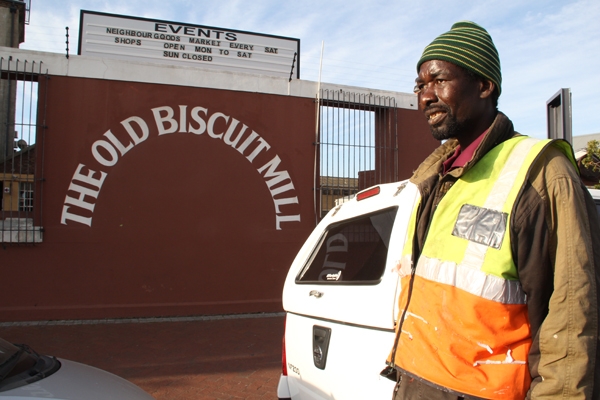Salt River “improvement” deprives car guards of income

Car guards outside the Old Biscuit Mill have been left without an income after the newly operational Salt River Business Improvement District (SRBID) told them to leave.
The SRBID argues that the parking attendants are contravening the City’s bylaw for streets and public places, and that they do not contribute to safety in the area.
Some of the Old Biscuit Mill staff, however, disagree. They say that the attendants provide a valuable service.
Isak Mashaba, 41, rents a room for his family of four in Salt River for R750 per month. Having suddenly lost his income as a car guard on Albert Road, he now fears that he won’t be able to pay his rent and may face eviction.
“We have to work long hours, from nine in the evening to one in the morning. Sometimes you make good money — up to R400. Other days, you come away with less than R100,” he said, standing alongside fellow car guard Ibrahim Fenton.
“What has been done here has upset us. Our group of guards have worked here six days a week for a number of years. The new guards came here and told us ‘you go away peacefully or we will call the Law Enforcement’.
“We have good relationships with our customers — especially the ones who work here and are regular. There are many criminals and chancers here, so we help by catching the thieves and handing them [over] to the police.”
The SRBID came into operation at the beginning of September. In a comprehensive response to GroundUp, spokesperson Gene Lohrentz outlined the SRBID’s vision “to establish and maintain a safe, clean, well-managed CBD area that attracts and retains business investment.”
According to him, the car guards operating outside the Old Biscuit Mill were at odds with this. Among the reasons he gave were that the guards encouraged people to park illegally, and they “claimed” public parking spaces as their own, demanding money for their use.
He also pointed to a city streets and public spaces bylaw which essentially prohibits anyone from soliciting a tip in return for an informal car guarding service.
“(During a perception survey among business owners and visitors to the area) numerous comments were received about informal parking attendants, and it was indicated that people felt intimidated by their aggressive approach to motorist in terms of insisting on being paid for their services,” said Lohrentz. “We therefore do not agree that the informal parking attendants offer an improvement to public safety in the area.”
The gentrification or “improvement” of the Cape Town CBD and surrounding suburbs has been hotly debated in recent years. Detractors of the Improvement District model argue that these are established solely to increase the property values and investment opportunity of areas – a policy which benefits business and property owners, while not making provisions for poorer people who are displaced, residentially or economically.
Some of the Biscuit Mill customers have challenged the notion that the attendants are a nuisance. Lerato Mmutle, who works at the Old Biscuit Mill, spoke of a good relationship and of a valuable service provided by them.
She felt “safe” knowing that Mashaba or “one of the other guys” would be there if she worked late. Bryden Arthur, a waiter at the Test Kitchen who also works late, agreed.
For Leif Petersen, from the Sustainable Livelihoods Foundation which conducts research and engages with vulnerable communities to advance security in income and livelihoods, the experience of the Old Biscuit Mill’s car guards is typical of a larger challenge posed by government to the country’s informal economy.
“Historically government has attempted to formalise the informal economy through stricter regulations and heavy handed law enforcement,” he said.
“To adopt a blanket regulatory approach to a sector of the economy that is inherently diverse is misguided and inappropriate. The grassroots of entrepreneurship and economic self-empowerment are found in the informal sector. It is not going away, and whilst regulation can play an important role, over-regulation adds little economic worth for the country. This is especially true in instances where the services provided are valued by customers and make a positive social contribution.”

This article is licensed under a Creative Commons Attribution-NoDerivatives 4.0 International License.


